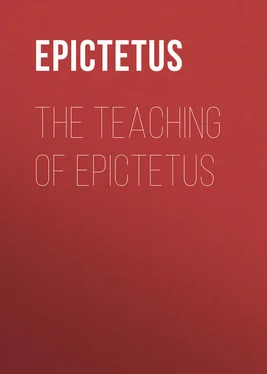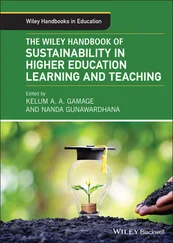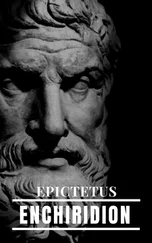Epictetus - The Teaching of Epictetus
Здесь есть возможность читать онлайн «Epictetus - The Teaching of Epictetus» — ознакомительный отрывок электронной книги совершенно бесплатно, а после прочтения отрывка купить полную версию. В некоторых случаях можно слушать аудио, скачать через торрент в формате fb2 и присутствует краткое содержание. Жанр: Философия, foreign_antique, foreign_prose, на английском языке. Описание произведения, (предисловие) а так же отзывы посетителей доступны на портале библиотеки ЛибКат.
- Название:The Teaching of Epictetus
- Автор:
- Жанр:
- Год:неизвестен
- ISBN:нет данных
- Рейтинг книги:5 / 5. Голосов: 1
-
Избранное:Добавить в избранное
- Отзывы:
-
Ваша оценка:
- 100
- 1
- 2
- 3
- 4
- 5
The Teaching of Epictetus: краткое содержание, описание и аннотация
Предлагаем к чтению аннотацию, описание, краткое содержание или предисловие (зависит от того, что написал сам автор книги «The Teaching of Epictetus»). Если вы не нашли необходимую информацию о книге — напишите в комментариях, мы постараемся отыскать её.
The Teaching of Epictetus — читать онлайн ознакомительный отрывок
Ниже представлен текст книги, разбитый по страницам. Система сохранения места последней прочитанной страницы, позволяет с удобством читать онлайн бесплатно книгу «The Teaching of Epictetus», без необходимости каждый раз заново искать на чём Вы остановились. Поставьте закладку, и сможете в любой момент перейти на страницу, на которой закончили чтение.
Интервал:
Закладка:
2. What is it, then, to be educated? It is to learn to apply the natural conceptions to each thing severally according to nature; and further, to discern that of things that exist some are in our own power 12 12 τὰ μέν εἰσιν ἐφ’ ἡμῖν, τὰ δὲ οὐκ ἐφ’ ἡμῖν. A fundamental distinction in the Epictetean system, which he sometimes expresses by the phrases, τὰ ἡμέτερα and τὰ τῶν ἄλλων – things that are our own and things that belong to others; or τὰ ἴδια and τὰ ἀλλότρια – things that are our proper concern, and things that are alien to us.
and the rest are not in our own power. And things that are in our own power are the will, and all the works of the will. And things that are not in our own power are the body, and the parts of the body, and possessions and parents and brethren and children and country and, in a word, our associates. Where now shall we place the Good? To what objects shall we apply it? To those which are in our own power? Then is health not good, and whole limbs and life? and are not children and parents and country? And who will bear with you if you say this? Let us, then, transfer it to these things. Now, can one be happy who is injured, and has missed gaining what is good? He cannot. And can such a one bear himself towards his fellows as he ought? How is it possible that he should? For I have it of nature that I must seek my own profit. If it profits me to own a piece of land, it profits me to take it from my neighbor. If it profits me to have a garment, it profits me to steal it from the bath. And hence wars, seditions, tyrannies, conspiracies. And how shall I be able to maintain a right mind towards God? for if I suffer injury and misfortune, it cannot be but He neglects me. And what have I to do with Him if He cannot help me? And, again, what have I to do with Him if He is willing to let me continue in the evils in which I am? Henceforth I begin to hate Him. Why, then, do we build temples and set up statues to Zeus as we do to powers of evil, such as Fever? 13 13 On the Mons Palatinus in Rome there stood a temple to Fever. Upton quotes from Gruter, p. xcvii., an interesting inscription to this divinity: Febri. Divæ. Febri. Sanctæ. Febri. Magnæ. Camilla. Amata. Pro. Filio. Male. Affecto. P.
And how is He now the Saviour and the Raingiver and the Fruitgiver? And verily, all this follows, if we place anywhere in external things the nature and being of the Good.
CHAPTER III
the master-faculty
1. Of all our faculties ye shall find but one that can contemplate itself, or, therefore, approve or disapprove itself. How far hath grammar the power of contemplation? Only so far as to judge concerning letters. And music? Only so far as to judge concerning melodies. Doth any of them, then, contemplate itself? Not one. But when you have need to write to your friend, grammar will tell you how to write; but whether to write or not, grammar will not tell. And so with the musical art in the case of melodies; but whether it is now meet or not to sing or to play, music will not tell. What, then, will tell it? That faculty which both contemplates itself and all other things. And what is this? It is the faculty of Reason; for we have received none other which can consider itself – what it is, and what it can, and what it is worth – and all the other faculties as well. For what else is it that tells us that a golden thing is beautiful, since itself doth not? Clearly it is the faculty which makes use of appearances. What else is it that judges of music and grammar, and the other faculties, and proves their uses, and shows the fit occasions? None else than this.
2. Thus the Gods, as it was fit they should, place that only in our power which is the mightiest and master thing, the right use of appearances; but other things are not in our power. Was it that they did not wish it? I indeed think that had they been able they had made over to us those things also; but this they could in no way do. For being on the earth, and bound up with this flesh and with these associates, how was it possible that as regards these we should not be hindered by external things? But what saith Zeus? “Epictetus, if it were possible, I would have made both this thy little body and thy little property free and unhampered. But forget not now that this is but finely tempered clay, and nothing of thine own. And since I could not do this, I have given thee a part of ourselves, this power of desiring and disliking, and pursuing, avoiding, and rejecting, and, in brief, the use of appearances. Have a care, then, of this, hold this only for thine own, and thou shalt never be hindered or hampered, thou shalt not lament, thou shalt not blame, thou shalt never flatter any man.” What then? Do these seem trifling matters? God forbid. Are you, then, not content with them? At least I pray the Gods I may be. 14 14 There is excellent MS. authority for this reading of the passage, which, however, is not Schweighäuser’s. The latter reads: “Be content with them, and pray to the Gods.”
3. But now having one thing in our power to care for, and to cleave to, we rather choose to be careful of many things, and to bind ourselves to many things, even to the flesh, and to possessions, and to brother and friend, and child and slave. And being thus bound to many things, they lie heavy on us and drag us down. So, if the weather be not fair for sailing, we sit down distraught and are ever peering forth to see how stands the wind. It is north. And what is that to us? When will the west wind blow? When it shall seem good to it, friend; or to Æolus. For it was not thee, but Æolus whom God made “steward of the winds.” 15 15 “Steward of the winds.” A quotation from Homer, Od. x. 21.
What then? It is right to devise how we may perfect the things that are our own, and to use the others as their nature is. And what, then, is their nature? As it may please God.
CHAPTER IV
the nature of the good
1. The subject for the good and wise man is his own master-faculty, as the body is for the physician and the trainer, and the soil is the subject for the husbandman. And the work of the good and wise man is to use appearances according to Nature. For it is the nature of every soul to consent to what is good and to reject what is evil, and to hold back about what is uncertain; and thus to be moved to pursue the good and to avoid the evil, and neither way towards what is neither good nor evil. For as it is not lawful for the money-changer or the seller of herbs to reject Cæsar’s coin, but if one present it, then, whether he will or no, he must give up what is sold for it, so it is also with the soul. When the Good appears, straightway the soul is moved towards it, and from the Evil. And never doth the soul reject any clear appearance of the good, no more than Cæsar’s coin. On this hangeth every movement both of God and man.
2. The nature and essence of the Good is in a certain disposition of the Will; likewise that of the Evil. What, then, are outward things? Matter for the Will, about which being occupied it shall attain its own good or evil. How shall it attain the Good? Through not being dazzled with admiration of what it works on. 16 16 “Through not being dazzled,” etc. Ἂν τὰς ὕλας μὴ θαυμάσῃ.
For our opinions of this, when right, make the will right, and when wrong make it evil. This law hath God established, and saith, “If thou wouldst have aught of good, have it from thyself.”
3. If these things are true (and if we are not fools or hypocrites), that Good, for man, lies in the Will, and likewise Evil, and all other things are nothing to us, why are we still troubled? why do we fear? The things for which we have been zealous are in no other man’s power; and for the things that are in others’ power we are not concerned. What difficulty have we now? But direct me , sayest thou. And why shall I direct thee? hath not God directed thee? hath He not given thee that which is thine own unhindered and unhampered, and hindered and hampered that which is not thine own? And what direction, what word of command didst thou receive from Him when thou camest thence? “Hold fast everything which is thine own – covet not that which is alien to thee. And faithfulness is thine, and reverence is thine: who, then, can rob thee of these things? Who can hinder thee to use them, if not thyself? But thyself can do it, and how? When thou art zealous about things not thine own, and hast cast away the things that are.” With such counsels and commands from Zeus, what wilt thou still from me? Am I greater than he? am I more worthy of thy faith? But if thou hold to these things, of what others hast thou need? But perchance these are none of his commands? Then bring forward the natural conceptions, bring the proofs of the philosophers, bring the things thou hast often heard, bring the things that thyself hast spoken, bring what thou hast read, bring what thou hast pondered.
Читать дальшеИнтервал:
Закладка:
Похожие книги на «The Teaching of Epictetus»
Представляем Вашему вниманию похожие книги на «The Teaching of Epictetus» списком для выбора. Мы отобрали схожую по названию и смыслу литературу в надежде предоставить читателям больше вариантов отыскать новые, интересные, ещё непрочитанные произведения.
Обсуждение, отзывы о книге «The Teaching of Epictetus» и просто собственные мнения читателей. Оставьте ваши комментарии, напишите, что Вы думаете о произведении, его смысле или главных героях. Укажите что конкретно понравилось, а что нет, и почему Вы так считаете.












